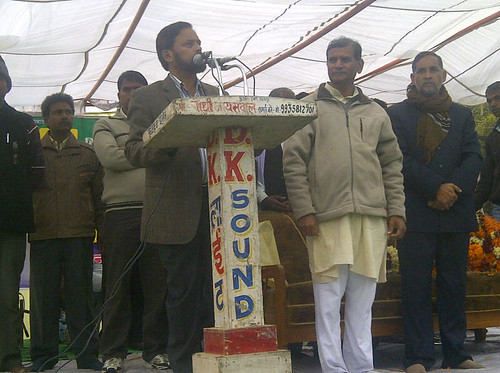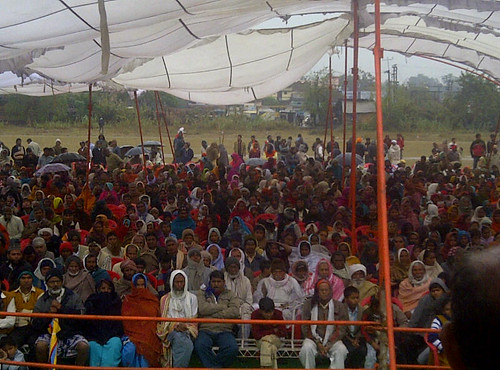By Md. Ali, TwoCircles.net,
Gorakhpur: For a reporter covering elections, what matters most is the parties and candidates who are in a position to win and therefore, can form the government. But one would be too ignorant to not to notice a political phenomenon, currently happening in the political landscape of Uttar Pradesh, specially in the context of the ongoing assembly elections.
Peace Party led by Dr. Ayyub Ansari, a surgeon and also a member of ansari (weaver community), is the political experiment which for now at least, might not appear to be a serious contender for power, but it certainly has the potential to change the way backward and Muslim politics is being done and perceived in the state.

Dr. Ayyub Ansari addressing the election rally at Chauri Chaura in Gorakhpur on Wednesday
Peace Party had first drawn attention when its candidates performed well in five Lok Sabha constituencies of eastern UP in 2009. In June 2010, the party took every body by surprise when it got more votes than the Samajwadi Party and Congress in the by-election for the Domariyaganj Assembly seat.
In the short period of just 4 years, since it was formed in 2008, the party has successfully created its own political space, mainly with the support of Most Backward Caste/classes (MBC) Muslims and the disgruntled Dalits of the Hindi heartland.
What is interesting in the ongoing UP elections is that Peace Party, in alliance with more than 12 political parties as well as some community based groups, have formed National Front, a political alliance and has fielded candidates on all the 403 assembly seats of Uttar Pradesh.
Groups like Apna Dal, Bundelkhand Congress, Parivartan Morcha, Bhartiya Lokhit Party, Pichhda Varg Mahasangh, the other groups in the National Front might not end up affecting much but out of 240 candidates of Peace Party, at least 30-40 seats are certainly to watch out for, not only in terms of winning but also for percentage of votes that they get.
Peace Party has the ability to attract voters from social castaways of all stripes — poor Brahmins, unrepresented caste groups and backward castes; and of course, their big ticket — Muslims. With the dangerous potential to attract and bring together such a diverse and disparate groups, the party’s attempt to carve out a political equation for electoral victory, is a bad news for mainstream political parties in the state.
The party has the potential to upset the plans of established political players like Samajwadi Party, the Congress and the BSP as it has started attracting support of groups which are traditionally the vote banks of these parties.
Muslims, the minority community which is being competitively and maddeningly wooed by both the SP and the Congress party, can be seen turning up in huge numbers at the Peace Party rallies, besides dalits and other most backward castes being prominent participants.
Even though the political analysts say that Peace Party might show its power and potential to the political class by cutting into the vote banks of the mainstream political players, but Dr. Ayyub disagrees with this analysis.
“Peace party is fighting this election, not to cut anybody’s votes or to divide secular votes, but to win on its own with the help of Ati-Pichhda Varg, the MBCs and Muslims,” Ayyub tells TwoCircles.net.
When I expressed my disagreement with Ayyub’s prediction that his party will get 40-50 seats, he advises journalists not to “underestimate” his party as “journalists, are famous for not interpreting but more often than not, for misreading elections.”
Ayyub also claimed that in the first phase of elections where Peace party is fighting on 55 seats, its expected to win Dumariaganj (in Siddharth Nagar district) Mehnon (Gonda), Kursi and Zaidpur (Barabanki), Matera (Bahraich) and Nanpara.
Whether you agree or disagree with Ayyub’s prediction, what one can’t ignore is the impressive crowd which turns up at the election rallies of the Peace party.
In spite of the fact that it was raining and winter had also planned to spoil election rallies, more than three thousand people turned up, waited for Ayyub and listened to him in an election rally at Chauri Chaura assembly constituency which will go to poll on February 11 in the second phase of UP elections.
Importantly only 10-15 percent of the crowd was Muslim. Chauri Chaura seat is an open seat where Peace Party has fielded a Scheduled caste candidate, Hari Lal Pasee which is off course an attempt to cut into Mayawati vote bank.
“I have been voting for Mayawati’s elephant symbol but I don’t see much development for my community. So don’t get surprised if I vote for fan (Peace party’s election symbol),” says Raj Narayan Nishad, a participant in election rally at the Chauri Chaura constituency.

The crowd at the election rally at Chauri Chaura
Even though it was raining, the audience preferred to take the help of plain plastic to save themselves from getting wet but sat attentively the entire time Ansari was attacking SP, BJP, BSP and the Congress for their alleged apathy towards the interests and development of backward castes and Muslims.
Dr. Ayyub quite well knows his constituency and individually names every dalit and backward caste, blaming the BSP and the SP for the lack of development.
Attacking the Mayawati government, Ansari says, “You name me even one single Chamar cabinet minister in Mayawati government. She has benefited not dalits but Jaats.”
Its due to strategic reasons that Ayyub avoids attacking the Brahmans and other upper castes who have found good place in Mayawati’s inner circle. Interestingly a Brahman group the All India Brahman Maha Sangh, also supports Peace Party. In this case, Jats, who aren’t a target group for Ayyub’s political ambition become his target of attack.
Mayawati hasn’t done any thing, Ansari alleges, for most backward castes and dalits like Kohar (potters), Lohar (iron- smith), Dhobi (washer-man), Teli , Paasi, Nishaad, Bind Maourya, Tamoli, Shakya, Rajbhar and Chauhan.
Attacking Mulayam Singh Yadav, Ansari accuses him of only exploiting the Muslim and Yadava communities for becoming the Chief Minister of UP for thrice.
“I will consider Mulayam to be a serious well wisher of Muslims and Yadavas, only when he makes a Muslim or any Yadav who doesn’t belong to his family, the Chief Ministerial candidate,” adds Ansari.
Jiski jitni hissedari, uski utni bhagedari (political participation should be equivalent to one’s population) is one prominent election slogan chanted by the party cadres.
The idioms and jargon of political empowerment used by the Peace party leadership, might appear to have been borrowed from other experiments like that of the BSP but the emergence of a serious contender for backward politics on the political landscape, is real.
Ayyub is fighting elections from Khalilabad seat in Sant Kabir Nagar district while his son is contesting from Azamgarh’s Mubarakpur, where backward Muslims have a strong presence.
While acknowledging Ayub’s emergence as an increasingly important face in Muslim and backward politics, Hari Joshi, editor of a local newspaper in Meerut, cautions: “Even though Peace party’s meetings are seeing good turnouts by a crowd from every community, it is to be seen how much of it gets translated into votes.”
Since the inception of Peace party, the media has been tagging it as a Muslim party but Dr. Ayyub categorically refuses to accept the pigeon holing and stereotyping of his party.
“We are not a Muslim party. Yes, indeed Muslims are on our priority list but so are the most backward castes and ati pichda vard,” says Dr. Ayyub.
In accordance with this political arithmetic, Dr. Ayyub has given maximum number of tickets, not to Muslims but dalits and other most backward castes, some thing for which his detractors in other political parties have accused him of ignoring Muslims who constitute around 18.5 % of the state population.
But Ayyub is quick to rebut these charges, saying that his party is the only party which has promised the Muslim community that it will realize the dreams of the first Muslim CM of the state.
Dr. Ayyub is strategic enough to know the dangers of raising identity related problems of minority community. So he avoids raising contentious and controversial issues of terror arrests of Muslim youths.
Yes, the Peace party supremo accuses the Congress party of dividing the country on communal lines on the name of terrorism.
Ayyub doesn’t emphasizes much on Muslim identity and symbolism but tries to include the minority community on its priority list on the basis of backwardness. Muslim being around 18.5 percent of the state population, the Peace party supremo is aware of the importance of muslim votes as well.
Dr. Ayyub highlights socio-economic problems affecting every socio-religious and caste groups, also arguing that socio-economic backwardness and absence of political empowerment of Muslim community are the root causes of its backwardness.
Ayyub promises free of cost education, health, 2 Rs/Kg grain and housing facilities to every body below poverty line.
But its not to say that the Peace Party doesn’t have the support of Muslim community in the state. Muslims form Peace party’s core vote base, irrespective of the fact that not enough Muslim candidates have been fielded by the party.

Election banner of Peace Party
When this correspondent talked to a cross section of Muslims living in Gorakhpur rural and city assembly constituencies, they don’t mind that Chhedi Paswan and Dr. Vijay Sinha have been fielded by the Peace party from their respective areas.
“Enough has been said about Peace party, what I know for sure is that it has the potential for resurrecting the community and bring about not only socio-economic but political empowerment of the community as well,” says Mahfooz Alam, who has been a Samajwadi Party voter but who thinks that the Mulayam led part has only exploited the minority community.
Of its Muslim vote base, weavers community of which 70% is constituted by Muslims, form a big vote base. Even though Rahul Gandhi managed to get several thousands of relief package for the weaving community, on the ground the package has failed to reach its targetted communities and groups. This grievance is another plank which Ayyub wants to exploit.
Interestingly political analysts believe that the acceptance of the Peace party among Muslims irrespective of a big number of Non-Muslim candidates fielded by the party, represents the fact that they don’t want any exclusivist Muslim party; instead they are pretty comfortable in the formation of a larger political platform of backward communities.
Importantly Ayyub manages to attract not only the backward and most backward classes/castes but also the comparatively backward section among upper castes like Brahmans and Khatriyas. He is bringing together all the disgruntled and grievanced sections among upper castes.
So it seems Dr. Ayyub is repeating some thing which was also done by Mayawati in the last assembly elections?
Dr. Ayyub disagrees. He talks about Mayawati’s “social engineering” versus his “social integration.” He argues that while the former stood for Mayawati’s attempt to mechanically bring together different caste groups, by “social integration” he is just trying to form a platform of oppressed and backward who want have the their due share in resources development and political power in the state.
Whether you agree or disagree with Dr. Ayyub prediction regarding winning 40-50 assembly seats in this elections, what you can’t do is to ignore his form of backward politics because Peace party can change, if it continues its present form, the landscape of the backward politics in the state.

